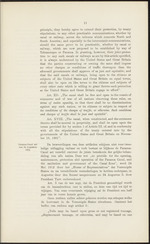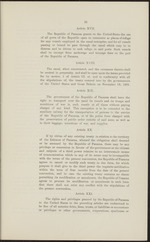| 1 |
 |
“...and Great Britain engage to afford”.
Art. III1. „The canal shall be free and open to the vessels of
commerce and of war of all nations observing these rules, on
terms of entire equality, so that there shall be no discrimination
against any such nation, or its citizens or subjets in respect of
the conditions of the charges of traffic, or otherwise. Such conditions
and charges of traffic shall be just and equitable”.
Art. XVIII. „The canal, when constructed, and the entrances
thereto shall be neutral in perpetuity, and shall be open upon the
terms provided for by section 1 of Article III. of, and in conformity
with all the stipulations of the treaty entered into by the
governments of the United States and Great Britain on Novem-
ber 18, 1901”.
De bewoordingen van deze artikelen schijnen niet voor twee-
ledige uitlegging vatbaar en toch bestaat er blijkens de Panama-
Canal act verschil omtrent de juiste beteekenis der gelijke behan-
deling van alle naties. Deze wet „to provide for the opening...”
|
|
| 2 |
 |
“...Article XVII.
The Republic of Panama grants to the United States the use
of all ports of the Republic open to commerce as places of refuge
for any vessels employed in the canal enterprise, and for all vessels
passing or bound to pass through the canal which may be in
distress and be driven to seek refuge in said ports Such vessels
shall be exempt from anchorage and tonnage dues on the part
of the Republic of Panama.
Article XVIII.
The canal, when constructed, and the entrances thereto shall
be neutral in perpetuity, and shall be open upon the terms provided
for by section 1 of Article III. of, and in conformity with all
the stipulations of, the treaty entered into by the governments
of the United States and Great Britain on November 18, 1901.
Article XIX.
The government of the Republic of Panama shall have the
right to transport over the canal its vessels and its troops and
munitions of war in such vessels at all times without paying
charges of any kind. This exemption is to be extended to...”
|
|
| 3 |
 |
“...States, in the
language above quoted from the Hay-Pauncefote Treaty, deprived
itself of the exercise of the right to pass its own commerce free
or to remit tolls collected for the use of the Canal ?
It will be observed that the rules specified in article 3 of the
treaty were adopted by the United States for a specific purpose,
namely, as the basis of the neutralization of the canal, and for
no other purpose. The article is a declaration of policy by the
United States that the canal shall be neutral; that the attitude
of this Government toward the commerce of the world is that
all nations will be treated alike and no discrimination made by
the United States against any one of them observing the rules
adopted by the United States. The right to the use of the canal
and to equality of treatment in the use depends upon the obser-
vance of the conditions of the use by the nations to whom we
extended that privilege. The privileges of all nations to whom we
extended the use upon the observance...”
|
|
